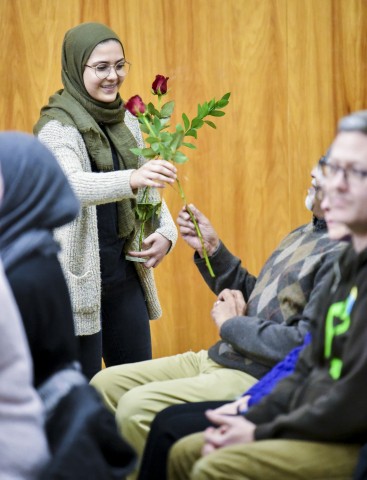On Jan. 29, two University of Saskatchewan students organized a vigil on the first anniversary of the Quebec City mosque shooting to commemorate the tragedy, which took the lives of six people and injured 19 more.

Roses were donated anonymously to the organizers, and then they were distributed to those who attended, as a token of gratitude.
The vigil was held at the Islamic Association of Saskatchewan, and there were approximately 60 people in attendance. On the one-year anniversary of the attack, U of S students discuss how this tragedy impacted them and the Muslim community in Saskatoon.
For Arisha Nazir, a health studies student and one of the organizers who was also the master of ceremonies at the event, it was an emotional moment when she named the six deceased men, as their pictures were shown on a screen before the audience. She explains that she felt the full impact of the tragedy as she spoke.
“In that moment, I remember I was reading… I was looking at the pictures, and I looked up and I saw my dad in the audience,” Nazir said. “Then, that’s when it started happening. I just felt really vulnerable.”
The mass shooting occurred a year ago, on Jan. 29, 2017, at the Centre Culturel Islamique de Québec during the evening prayers at the mosque. Laval University student Alexandre Bissonnette perpetrated the attack on the worshippers in the mosque, leaving Canadians across the country in shock reaching as far as the Muslim community in Saskatoon, whose members also felt vulnerable and targeted.
The meaning of the vigil may be interpreted differently from person to person, but to Kota Kimura, a U of S alumnus and member of the Anti-Racist Organizing Committee, the vigil was a symbol of fighting against bigotry and fascism.
“I fully stand in solidarity with the Muslim communities and other people who face the oppression of white supremacy and colonialism and imperialism,” Kimura said. “We are seeing [a] resurgence of fascism, … which the perpetrator of the shooting represented. I think it is important for us to unite and fight back against this resurgence together.”
At the vigil, Nazir mentioned that the Canadian Muslim community has asked the federal government to designate Jan. 29 as a national day of remembrance and action on Islamophobia. In an interview after the memorial service, Mayor Charlie Clark noted that he was previously unaware of this petition, but that he and the City of Saskatoon would be willing to consider acting on such a request.
“Given the number of people in our community that this impacts and the show of support beyond the Muslim community, I think it’s something that we would welcome to see at City Council for consideration,” Clark said.
Anum Mehdi, a final-year student in kinesiology, notes that she once believed that Canada promotes inclusivity between different groups of people, but after the shooting last year, her view has changed.
“As much as we enjoy to boast about how inclusive and accepting Canada is, events such as this make you realize that maybe you are not so safe after all,” Mehdi said, in an email to the Sheaf.
Balsam Arwini, a first-year medical education student, says she wishes there were more safe spaces available for marginalized groups of people.
“I don’t feel secure, in the sense that I — along with many of my Muslim friends — often try to find the quietest places in Health Sciences, with the least amount of foot traffic, in order to complete our prayers,” Arwini said, in an email to the Sheaf. “I don’t think safe spaces for different subgroups of people in the student body are as well-known [or] advertised as they should be.”
Amani Khelifa, a fifth-year history student and the other organizer of the event along with Nazir, says that the vigil was meant to commemorate the Quebec City mosque shooting and also serve as a day to remember that Islamophobia and xenophobia still exist in society. She discusses how the U of S is very welcoming to all students of various faith groups, but that there have been moments where she felt unaided.
“I love the U of S — I love my experience here. I think our campus community is really diverse and really welcoming. But, it’s just one or two times. Things pop up once in a while that sort of remind you that ‘Oh, this is a problem, actually,’ and that Islamophobia does exist,” Khelifa said.
Both Khelifa and Nazir consider Canada to be an accepting society, and in light of the mass shooting, their perspectives remain unchanged. Khelifa explains that the vigil held last year, which took place outside of City Hall, was an example of how united the Saskatoon community is, despite differing religious affiliations.
“As terrible as this [violent] event was, I think that there are lots of things that we don’t see that are very beautiful and very captivating,” Khelifa said. “[The vigil] was also a moment [to say] ‘This is our potential…’ And, we owe it to ourselves to reach that potential.”
—
Photo and text: J.C. Balicanta Narag
Leave a Reply